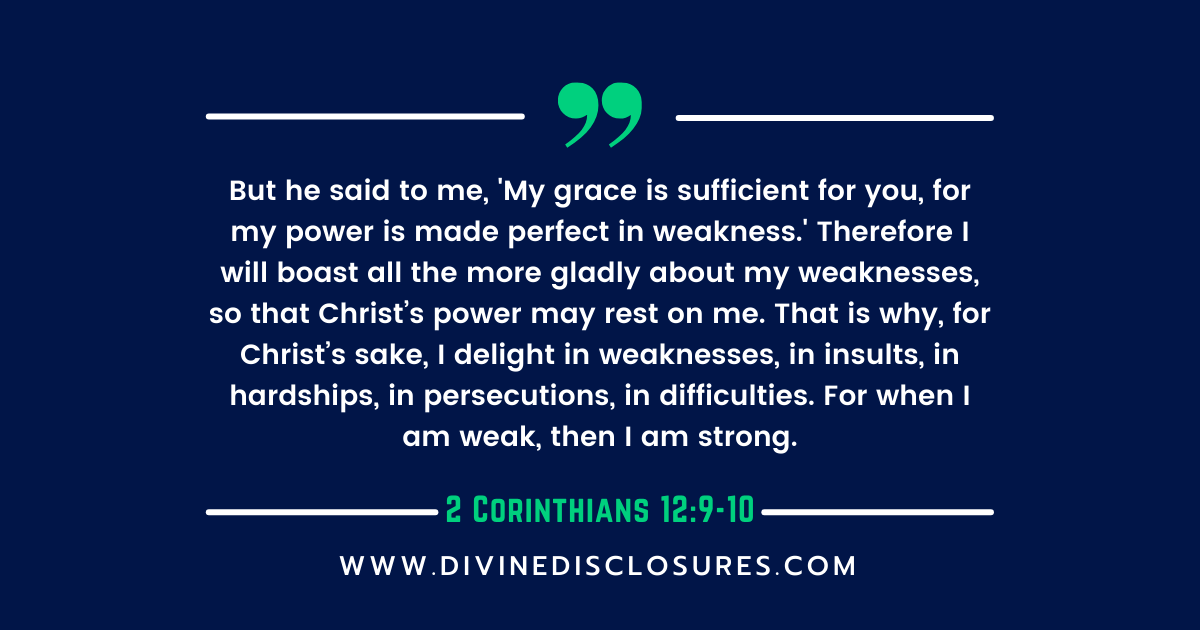In a letter overflowing with bold declarations of apostolic authority, we encounter one of the most paradoxical sayings in all of Scripture. After recounting a stunning vision of heaven, Paul discloses in 2 Corinthians 12:9-10 a “thorn in the flesh” that torments him and shatters his spiritual invincibility:
“Therefore, in order to keep me from becoming conceited, I was given a thorn in my flesh, a messenger of Satan, to torment me. Three times I pleaded with the Lord to take it away from me. But he said to me, ‘My grace is sufficient for you, for my power is made perfect in weakness.’ Therefore I will boast all the more gladly about my weaknesses, so that Christ’s power may rest on me. That is why, for Christ’s sake, I delight in weaknesses, in insults, in hardships, in persecutions, in difficulties. For when I am weak, then I am strong.”
At first read, Paul’s delight in hardship seems to border on masochism. How could the battle-hardened apostle who suffered severely for the gospel find pleasure in persecution? As we unpack this passage through the lens of the New Testament and the illumination of the Spirit, we unveil a shocking paradox: that in our insufficient humanity, we become conduits for the all-surpassing power of the living Christ.
We proceed open to the unsettling work of the Spirit who may call us to relinquish strength and embrace weakness that we might decrease, while Christ increases and reigns supreme over our lives and ministry. For it is in our emptiness that we encounter the fullness of God’s indwelling grace.
Table of Contents
2 Corinthians 12:9-10 – My Grace is Sufficient for You Verse

Here are the translations of 2 Corinthians 12:9-10 with their references:
2 Corinthians 12:9-10 (KJV)
“And he said unto me, My grace is sufficient for thee: for my strength is made perfect in weakness. Most gladly therefore will I rather glory in my infirmities, that the power of Christ may rest upon me. Therefore I take pleasure in infirmities, in reproaches, in necessities, in persecutions, in distresses for Christ’s sake: for when I am weak, then am I strong.”
2 Corinthians 12:9-10 (ESV)
“But he said to me, ‘My grace is sufficient for you, for my power is made perfect in weakness.’ Therefore I will boast all the more gladly of my weaknesses, so that the power of Christ may rest upon me. For the sake of Christ, then, I am content with weaknesses, insults, hardships, persecutions, and calamities. For when I am weak, then I am strong.”
2 Corinthians 12:9-10 (NIV)
“But he said to me, ‘My grace is sufficient for you, for my power is made perfect in weakness.’ Therefore I will boast all the more gladly about my weaknesses, so that Christ’s power may rest on me. That is why, for Christ’s sake, I delight in weaknesses, in insults, in hardships, in persecutions, in difficulties. For when I am weak, then I am strong.”
2 Corinthians 12:9-10 (NKJV)
“And He said to me, ‘My grace is sufficient for you, for My strength is made perfect in weakness.’ Therefore most gladly I will rather boast in my infirmities, that the power of Christ may rest upon me. Therefore I take pleasure in infirmities, in reproaches, in needs, in persecutions, in distresses, for Christ’s sake. For when I am weak, then I am strong.”
2 Corinthians 12:9-10 (AMPLIFIED)
“But He said to me, ‘My grace is sufficient for you [My lovingkindness and My mercy are more than enough—always available—regardless of the situation]; for [My] power is being perfected [and is completed and shows itself most effectively] in [your] weakness.’ Therefore, I will all the more gladly boast in my weaknesses, so that the power of Christ [may completely enfold me and] may dwell in me. So I am well pleased with weaknesses, with insults, with distresses, with persecutions, and with difficulties, for the sake of Christ; for when I am weak [in human strength], then I am strong [truly able, truly powerful, truly drawing from God’s strength].”
2 Corinthians 12:9-10 (NLT)
“Each time he said, ‘My grace is all you need. My power works best in weakness.’ So now I am glad to boast about my weaknesses, so that the power of Christ can work through me. That’s why I take pleasure in my weaknesses, and in the insults, hardships, persecutions, and troubles that I suffer for Christ. For when I am weak, then I am strong.”
2 Corinthians 12:9-10 (NASB)
“And He has said to me, ‘My grace is sufficient for you, for power is perfected in weakness.’ Most gladly, therefore, I will rather boast about my weaknesses, so that the power of Christ may dwell in me. Therefore I am well content with weaknesses, with insults, with distresses, with persecutions, with difficulties, for Christ’s sake; for when I am weak, then I am strong.”
2 Corinthians 12:9-10 (MSG)
“And then he told me, ‘My grace is enough; it’s all you need. My strength comes into its own in your weakness.’ Once I heard that, I was glad to let it happen. I quit focusing on the handicap and began appreciating the gift. It was a case of Christ’s strength moving in on my weakness. Now I take limitations in stride, and with good cheer, these limitations that cut me down to size—abuse, accidents, opposition, bad breaks. I just let Christ take over! And so the weaker I get, the stronger I become.”
My Grace is Sufficient For You Meaning And 2 Corinthians 12:9-10 Meaning
The meaning of 2 Corinthians 12:9-10 is as follows:
2 Corinthians 12:9-10 encapsulates a profound paradox that lies at the heart of the Christian experience. Despite our natural inclination to seek deliverance from our weaknesses and afflictions, these verses reveal that true strength is found in embracing our frailties with humility and reliance upon God’s sufficient grace. Paul’s thorn in the flesh serves as a poignant reminder that our weaknesses are not obstacles to be overcome, but vessels through which the power of Christ is made manifest. When we surrender our self-sufficiency and boast in our weaknesses, we create space for God’s grace to be perfected within us, transforming our struggles into conduits of divine strength.
2 Corinthians 12:9-10 challenges the conventional pursuit of self-reliance, inviting us to adopt a posture of vulnerability and dependence, where our limitations become catalysts for experiencing the inexhaustible power of Christ’s sustaining grace. Ultimately, they redefine true strength not as the absence of weakness, but as the humble embrace of our frailties, allowing God’s grace to shine forth in undeniable power.
If you are interested in delving deeper, let’s wade into a deeper study of 2 Corinthians 12 verses 9-10’s My Grace is Sufficient For You Meaning.
Exegetical Analysis of 2 Corinthians 12:9-10
2 Corinthians 12:9-10 declares:
“And He said to me, ‘My grace is sufficient for you, for My strength is made perfect in weakness.’ Therefore most gladly I will rather boast in my infirmities, that the power of Christ may rest upon me. Therefore I take pleasure in infirmities, in reproaches, in needs, in persecutions, in distresses, for Christ’s sake. For when I am weak, then I am strong.” (NKJV)
These verses record Paul’s response to the “thorn in the flesh” he had pleaded with the Lord to remove (v. 8). Though the nature of this “thorn” is not specified, it clearly brought significant weakness and vulnerability into Paul’s life and ministry. Yet Christ’s reply reveals profound spiritual realities:
The Lord’s words “My grace is sufficient for you” (Ἀρκεῖ σοι ἡ χάρις μου) use the present indicative verb ἀρκεῖ – “is sufficient” or “is enough.” Grace (χάρις) is not just a past transaction but a continually sufficient supply for every need.
The reason is given: “For My strength is made perfect in weakness” (ἡ γὰρ δύναμίς μου ἐν ἀσθενείᾳ τελεῖται). The present passive verb τελεῖται (“is perfected” or “reaches its end”) indicates God’s dynamic power (δύναμις) is continually brought to its full expression and accomplishes its purpose through human weakness (ἀσθενεία).
Paul’s response in verse 9 shows his wholehearted embrace of this principle: “Most gladly therefore I will rather boast in my infirmities” (ἥδιστα οὖν μᾶλλον καυχήσομαι ἐν ταῖς ἀσθενείαις μου). The future indicative καυχήσομαι (“I will boast”) suggests a continual attitude, not just a one-time declaration.
Verse 10 reinforces this with five areas he gladly accepts precisely because they make space for Christ’s power: “infirmities, reproaches, needs, persecutions, distresses” (ἐν ἀσθενείαις, ἐν ὕβρεσιν, ἐν ἀνάγκαις, ἐν διωγμοῖς, ἐν στενοχωρίαις).
The reason is clear: “For when I am weak, then I am strong” (ὅταν γὰρ ἀσθενῶ, τότε δυνατός εἰμι). The present subjunctive ἀσθενῶ (“I am weak”) denotes a continual state, matched by the present indicative δυνατός εἰμι (“I am strong”) – true spiritual strength manifests itself through embraced weakness.
In summary, Paul rejoices that his areas of human weakness and frailty become the very channels through which the resurrection power of Christ is demonstrated. Instead of the “thorn” being removed, Christ’s grace proves altogether sufficient, and Paul celebrates these weaknesses as opportunities for Christ’s strength to be perfected in Him. This is the paradox and triumph of the Spirit-filled life!
Historical and Cultural Background of 2 Corinthians 12:9-10
The historical and cultural contexts add more understanding:
Greco-Roman Power Values
In the Greco-Roman world that Paul ministered in, power, status, and strength were highly valued. Virtues like self-sufficiency, honor, and domination were seen as marks of greatness. Conversely, any form of weakness or vulnerability was viewed as something to be overcome or hidden in shame.
Paul’s “Thorn” and Suffering
As Paul recounts, he pleaded with God three times to remove the “thorn in the flesh” that tormented him (v.7-8). Whether a physical ailment, demonic oppression, or ongoing persecution, it brought great weakness and humiliation for Paul, robbing him of status and strength in the world’s eyes.
Redefining Power and Strength
Yet God redefines power and strength through Paul’s thorn. Amid Paul’s weakness and vulnerability, God’s grace and power are most evident and effective. Christ’s resurrection power can rest most fully on Paul precisely because he boasts in his weakness rather than self-reliance. This is the great paradox and mystery of the cross – that vulnerability leads to power in Christ.
Boasting in Weakness
For the elites of Greco-Roman society who despised any weakness, Paul’s statements in v.9-10 were completely subversive. He presents an upside-down kingdom value system where believers actually boast joyfully in their weaknesses as opportunities for Christ’s power to flow. All sources of pain, persecution, and difficulty are affirmed as entryways for divine strength.
For the suffering yet faithful believers in places like Corinth, this was a powerful affirmation of their struggles. Their human weakness didn’t disqualify them but was the path for Christ’s resurrection power to be revealed through them as they boasted in their need for Him alone. This spiritual dynamic continues to empower Spirit-filled believers globally today.
Theological and Practical Applications of 2 Corinthians 12:9-10
This profound “my Grace is sufficient for you” meaning unveils core truths about God’s strength perfected through human weakness.
Theological Foundations
Theologically, these verses reveal:
- Sufficiency of God’s Grace – Divine grace alone supplies what is needed to endure suffering or persevere in trials and ministry, not self-strength.
- Divine Power Perfected in Weakness – Human weakness provides the very canvas for exhibiting Christ’s resurrection power flowing through surrendered believers.
- Delight in Weakness – A self-emptying posture of embracing human limitations allows Christ’s in-working strength to be magnified, not one’s own abilities.
- Power through Union with Christ – Identification with Christ’s sufferings produces conformity to His death that His resurrection life may course powerfully through willing weakness (Phil 3:10).
Practical Applications
On a practical level, these truths provide direction regarding:
Embracing Personal Weaknesses
Rather than despising areas of human frailty, failings, or limitations:
- Identify natural weaknesses honestly in humility before God. Ask Him to manifest His power through them.
- Rejoice in weaknesses as reminders of depending on God’s sufficient grace rather than self-sufficiency.
- Fix your boast not on personal strengths or gifting, but on Christ’s mighty power accomplished through you.
Responding Rightly to Sufferings
Amid afflictions, insults, hardships, or persecutions:
- Recognize these as opportunities to experience Christ’s sustaining, overcoming grace in action.
- Welcome such trials as a means to bear witness to Christ’s resurrection power flowing unobstructed through your surrendered weakness.
- Delight in them as privileges to know the fellowship of sharing in Jesus’ sufferings in service of His kingdom.
So what does 2 Corinthians 12:9-10 mean?
In summary, 2 Corinthians 12:9-10 and the popular “My Grace Sufficient For you” Scripture elevates human weakness from a liability to a platform of spiritual potency. By boasting not in self-reliance but one’s need for God’s power to be perfected through admitted inadequacy, His matchless grace produces heroic strength amid seeming frailty. May the Spirit enable willing weakness that exalts Christ’s resurrection life overwhelming our limitations.
Moving Beyond this Article on I2 Corinthians 12:9-10
Knowing 2 Corinthians 12:9-10 and the meaning of “My Grace is sufficient for you” is just the start. Continue exploring other explanations of Bible Verses to keep strengthening your life. Divine Disclosures offers wisdom for boasting in weakness and finding strength in Christ. Share this article with others struggling to relinquish self-sufficiency and rely on God’s grace.
As you walk this difficult yet hope-filled road of faith, take heart that God’s power is perfected in weakness. There is no limit to what He can accomplish through those who embrace their limitations and inadequacies. You can delight in insults, persecutions, and weaknesses, for when you are weak, then Christ’s strength shines through you. God’s grace is sufficient; His power is made perfect in your weakness.










